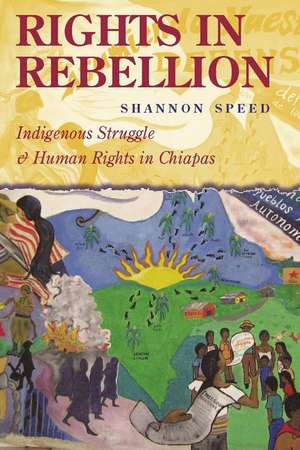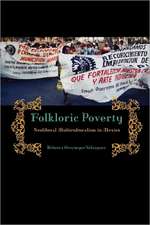Rights in Rebellion: Indigenous Struggle and Human Rights in Chiapas
Autor Shannon Speeden Limba Engleză Paperback – 20 noi 2007
Rights in Rebellion examines the global discourse of human rights and its influence on the local culture, identity, and forms of resistance. Through a multi-sited ethnography of various groups in the indigenous communities of Chiapas, Mexico—from paramilitaries to a Zapatista community, an indigenous human rights organization, and the Zapatista Good Governance Councils—the book explores how different groups actively engage with the discourse of rights, adapting it to their own individual subjectivities and goals, and develop new forms of resistance to the neoliberal model and its particular configurations of power.
Far from being a traditional community study, this book instead follows the discourse of human rights and indigenous rights through their various manifestations. The author offers a compelling argument for the importance of a critical engagement between the anthropologist and her "subjects," passionately making the case for activist research and demonstrating how such an engagement will fortify and enliven academic research.
Far from being a traditional community study, this book instead follows the discourse of human rights and indigenous rights through their various manifestations. The author offers a compelling argument for the importance of a critical engagement between the anthropologist and her "subjects," passionately making the case for activist research and demonstrating how such an engagement will fortify and enliven academic research.
| Toate formatele și edițiile | Preț | Express |
|---|---|---|
| Paperback (1) | 162.45 lei 3-5 săpt. | |
| Stanford University Press – 20 noi 2007 | 162.45 lei 3-5 săpt. | |
| Hardback (1) | 618.69 lei 6-8 săpt. | |
| Stanford University Press – 20 noi 2007 | 618.69 lei 6-8 săpt. |
Preț: 162.45 lei
Nou
Puncte Express: 244
Preț estimativ în valută:
31.08€ • 33.87$ • 26.19£
31.08€ • 33.87$ • 26.19£
Carte disponibilă
Livrare economică 02-16 aprilie
Preluare comenzi: 021 569.72.76
Specificații
ISBN-13: 9780804757348
ISBN-10: 0804757348
Pagini: 264
Dimensiuni: 152 x 229 x 18 mm
Greutate: 0.41 kg
Editura: Stanford University Press
Colecția Stanford University Press
ISBN-10: 0804757348
Pagini: 264
Dimensiuni: 152 x 229 x 18 mm
Greutate: 0.41 kg
Editura: Stanford University Press
Colecția Stanford University Press
Recenzii
"This excellent study belongs to the tiny percentage of works emerging out of the 1994 Zapatista rebellion that are actually based on extensive experience and engagement within the indigenous communities of Chiapas . . . This book offers insight for anyone interested in understanding the complexity of the Zapatista struggle for autonomy and getting beyond simplistic assumptions about indigenous and campesino identities and interests. It is also a valuable and thought-provoking work for scholars examining the concepts of human rights and citizenship in the era of neoliberal globalization, and for anyone concerned with the ethics and epistemology of ethnographic research."—Richard Stahler-Sholk, The Americas
"Based upon decade of experience in Chiapas, Mexico, as an activist and anthropological researcher, Speed provides a stimulating, highly readable overview of the challenges of promoting universal human rights in a local context of protracted civil war and indigenous struggle."—P. R Sullivan, Choice
"Her book provides an illustration of the ways in which people mix ideologies and conceptions of collective and individual rights to address political and economic disadvantages in the distinct context of their communities."—The Law and Politics Book Review
"Shannon Speed takes a clear position as an activist anthropologist, providing valuable insights into how political commitments and participation can complement high quality research. Her work breaks important terrain in legal anthropology." —Lynn Stephen, author of Zapatista Lives! and Transborder Lives
"Working at the intersections between transnational rights discourses and political, legal, and ethnic movements in Mexico, Shannon Speed elegantly interweaves theoretical analysis, empirical description, historical contextualization, and personal engagement to offer a finely grained ethnography of contemporary events in Chiapas. This work will be a major and enduring contribution." —Mark Goodale, George Mason University
Notă biografică
Shannon Speed is Assistant Professor of Anthropology at the University of Texas at Austin. She is coeditor of Dissident Women: Gender and Cultural Politics in Chiapas (2006).
Descriere
An anthropological examination of the globalized discourse of human rights and the local production of cultural identities and forms of resistance in indigenous communities of Chiapas, Mexico.











